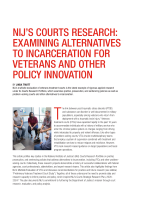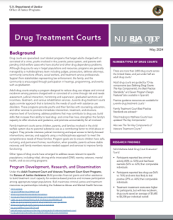Problem-solving courts
Detecting Fentanyl Use Through Court-Ordered Mandatory Drug Testing
Researchers develop a more accurate picture of fentanyl use prevalence among people under court-ordered mandatory drug testing.
Research Abstract: National Institute of Justice's Multisite Evaluation of Veterans Treatment Courts
NIJ Multisite Impact and Cost-Efficiency Evaluation of Veterans Treatment Courts, Fiscal Year 2022
Deadline Notice
The deadline for the funding opportunity discussed in this video has passed.
See the YouTube Terms of Service and Google Privacy Policy
NIJ’s Courts Research: Examining Alternatives to Incarceration for Veterans and Other Policy Innovation
NIJ’s evaluation of veterans treatment courts is a recent example of applied research under its Courts Research Portfolio, which examines pretrial, prosecution, and sentencing policies; problem-solving courts, and other alternatives to incarceration.
Census of Problem-Solving Courts (Bureau of Justice Statistics)
The 2012 Census of Problem-Solving Courts (CPSC) involved the collection of data from all active problem-solving courts. In order to be considered a problem-solving court, it must have (1) operated within the judiciary, (2) operated under the direction of a judicial officer, (3) been active in the reference year, and (4) used therapeutic services to reduce recidivism. A variety of data elements were collected in...
NIJ's Courts Research: Examining Alternatives to Incarceration for Veterans and Other Policy Innovation
Problem-Solving Courts: Fighting Crime by Treating the Offender
Due Process and the Role of Judges
Try Again, Fail Again, Fail Better: Lessons from Community Courts
Change doesn't come easy, particularly within an institution as large and complex as the criminal justice system. Greg Berman, Director of the Center for Court Innovation, offered lessons from several efforts to make reform stick in criminal justice settings. In particular, he focused on the development of community courts — experimental court projects that are attempting to reduce both crime and incarceration in dozens of cities across the U.S. and around the world.
See the YouTube Terms of Service and Google Privacy Policy
Discussing the Future of Justice-Involved Young Adults
New science in brain development is transforming young adult involvement with the justice system. On Tuesday, September 8, Attorney General Loretta Lynch, Assistant Attorney General Karol Mason, and experts from NIJ and the Harvard Kennedy School Program in Criminal Justice who serve on the Executive Session on Community Corrections discussed the future of justice-involved young adults.
See the YouTube Terms of Service and Google Privacy Policy
Drug Treatment Courts
Implementing, Disseminating and Translating Evidence-Based Policy/Practice in Community Corrections
Drug Courts Reexamined




